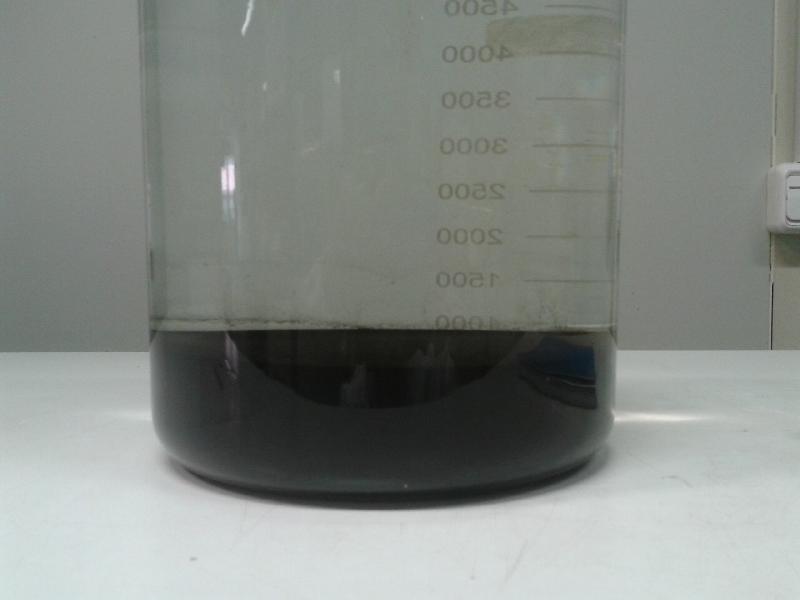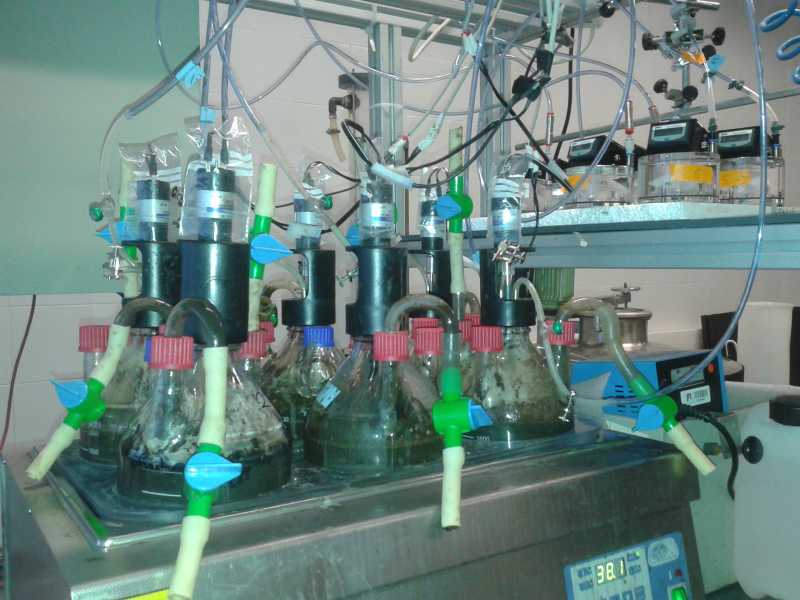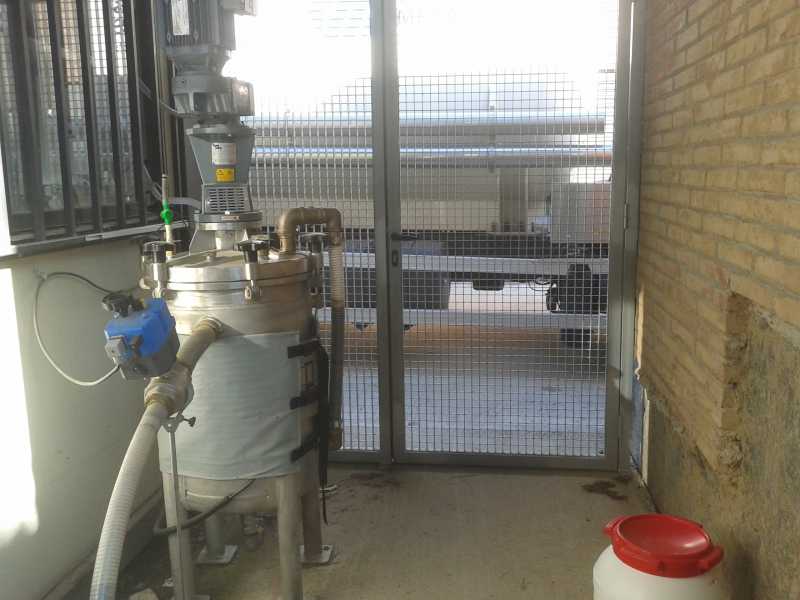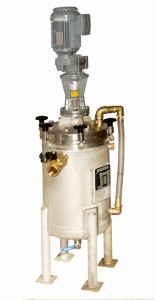- Sanitation systems
- Treatment of wastewater, sludges, organic waste, excreta
- Anaerobic treatment systems (biogas sanitation)
- Biogas sanitation (systems focusing on biogas production)
- Increase of biogas production using low-cost nanoparticles (Uni Barcelona), Spain
Increase of biogas production using low-cost nanoparticles (Uni Barcelona), Spain
25.8k views
Re: Increase of Biogas Production Using Low Cost Nanoparticles-FOR THE FORUM
See how the nanoparticles increase the biogas production after a lag phase.
However, the problem is to reproduce these results obtained in batch mode in continuous reactors.
Some ideas?
However, the problem is to reproduce these results obtained in batch mode in continuous reactors.
Some ideas?
Antoni Sánchez Ferrer (male, PhD) is Full Professor in the Department of Chemical Engineering at the Universitat Autònoma of Barcelona. His main research activities have been focused on biological waste treatment, especially on composting processes.
scholar.google.es/citations?user=f2hh0z8AAAAJ&hl=ca
scholar.google.es/citations?user=f2hh0z8AAAAJ&hl=ca
Attachments:
-
NPs1_2013-05-27.JPG (Filesize: 14KB)
Please Log in to join the conversation.
You need to login to replyRe: Increase of biogas production using low cost nanoparticles (Universitat Autònoma de Barcelona, Spain)
Dear all
This is a summary, of the main objectives of our Grant (find full information and introduction of myself below):
About myself
My name is Dr. Antoni Sánchez and I am Full Professor in the Department of Chemical Engineering at the Universitat Autònoma of Barcelona. My main research activities have been focused on biological waste treatment, especially on composting processes and anaerobic digestion. I am now the Coordinator of the Composting Research Group.
During my research career, I have published more than ninety ISI-refereed papers on different aspects of biotechnology and environmental sciences, and my works have received more than 1700 citations. I have been the supervisor of many PhD, Master and Undergraduate students and I have acted as the principal investigator of numerous research projects from public institutions and contracts with private companies.
More details can be found at:
scholar.google.es/citations?user=f2hh0z8AAAAJ&hl=ca
Title of grant: Increase of biogas production using low-cost nanoparticles
Subtitle (more descriptive title): Increase of biogas production using low-cost nanoparticles and production of sanitized compost from digested materials.
Name of lead organization: Universitat Autònoma de Barcelona
Primary contact at lead organization: Toni Sánchez
Grantee location: Barcelona, Spain
Developing country where the research is being tested: Spain
Short description of the project:
We have observed in batch experiments how the introduction on iron oxide nanoparticles in a standard anaerobic digester of wastewater sludge is able to increase the production of biogas by more than 70%. These experiments have been conducted at low-scale (1 L) and using pure substrates as cellulose. Our main interest is to see if this increase in the biogas production and, inconsequence, in renewable energy produced from wastes, is also observed under realistic conditions, that is:
To increase the production of biogas from sludge and other organic solid wastes using low cost iron oxide biocompatible nanoparticles (FeNPs) and the simultaneous production of high quality sanitized compost.
Objectives (or activities or key research components):
Grant type: Grand Challenges Explorations, Round 7 (GCE R7)
Funding for this research currently ongoing: We have built all the reactors. A small amount of money is available to cover the consumables and analytical costs.
Research or implementation partners: we are in contact with the Spanish company “Cassa” (www.cassa.es), which is working in the field of wastewater sanitation. We are comparing the results of our anaerobic digester with the full-scale digester (1000 cubic meters) of the wastewater of Sabadell (Barcelona) to compare both reactors. The final aim of the project is to test the FeNPs in the full-scale digester.
We are also in close collaboration with ICN (Institute Catalan of Nanotechnology) to design systems for the production of NPs at very low-cost and substituting some expensive chemicals such as TMAOH (tetramethylammonium hydroxide) by sodium hydroxide to stabilize the NPs. Although these stabilizers are used in low amounts, they can suppose more than 50% of the cost of NPs, but they are crucial for an optimal behavior.
Biggest successes so far:
We now know that our experiments in batch mode are reproducible and, after a lag phase, biogas is increasing suddenly to values that in some cases suppose to double the biogas production from sludge without adding FeNPs.
Additionally, the evolution of the digesters is more stable when adding FeNPs, and the typical perturbations of anaerobic digesters disappear.
Another possible use of NPs is as flocculants, which we are now testing with positive results.
Currently, the sludge product is sanitised and transformed into a high quality compost.
Main challenges / frustration:
When passing to continuous process, we are not able to select a proper concentration of FeNPs in the digester to see a increase in biogas production, although the process is more stable. We are working now in a new batch with new NPs, as it seems that little changes in the production of NPs (size, stabilizer used) are the cause of this problem.
Links, further readings, etc:
We are in the final stage of submitting our main first results to the journal "Science". Of course, the paper includes the funding of Gates Foundation in the acknowledgements. However, the paper is still in the hands of English revisers. I would prefer to include a link when the paper is published (in Science or other journal).
The FeNPs:
The Lab Reactor:
The Pilot Reactor:
This is a summary, of the main objectives of our Grant (find full information and introduction of myself below):
- Scale-up the anaerobic digestion to develop continuous or semi-continuous processes, similar to those of full-scale reactors.
- Scale-up the production of iron oxide NPs to have an estimation of the production costs of these materials at full-scale.
- To test if the increase production of biogas is stable in time and the digester is able to overcome the typical feed variations when using wastewater sludge as substrate.
- To test other real wastes to determine the feasibility of the process (for instance, MSW and manure).
About myself
My name is Dr. Antoni Sánchez and I am Full Professor in the Department of Chemical Engineering at the Universitat Autònoma of Barcelona. My main research activities have been focused on biological waste treatment, especially on composting processes and anaerobic digestion. I am now the Coordinator of the Composting Research Group.
During my research career, I have published more than ninety ISI-refereed papers on different aspects of biotechnology and environmental sciences, and my works have received more than 1700 citations. I have been the supervisor of many PhD, Master and Undergraduate students and I have acted as the principal investigator of numerous research projects from public institutions and contracts with private companies.
More details can be found at:
scholar.google.es/citations?user=f2hh0z8AAAAJ&hl=ca
Title of grant: Increase of biogas production using low-cost nanoparticles
Subtitle (more descriptive title): Increase of biogas production using low-cost nanoparticles and production of sanitized compost from digested materials.
Name of lead organization: Universitat Autònoma de Barcelona
Primary contact at lead organization: Toni Sánchez
Grantee location: Barcelona, Spain
Developing country where the research is being tested: Spain
Short description of the project:
We have observed in batch experiments how the introduction on iron oxide nanoparticles in a standard anaerobic digester of wastewater sludge is able to increase the production of biogas by more than 70%. These experiments have been conducted at low-scale (1 L) and using pure substrates as cellulose. Our main interest is to see if this increase in the biogas production and, inconsequence, in renewable energy produced from wastes, is also observed under realistic conditions, that is:
- At least, pilot scale reactors
- With continuous feed
- With other wastes, such as MSW
To increase the production of biogas from sludge and other organic solid wastes using low cost iron oxide biocompatible nanoparticles (FeNPs) and the simultaneous production of high quality sanitized compost.
Objectives (or activities or key research components):
- Scale-up the anaerobic digestion to develop continuous or semi-continuous processes, similar to those of full-scale reactors.
- Scale-up the production of iron oxide NPs to have an estimation of the production costs of these materials at full-scale.
- To test if the increase production of biogas is stable in time and the digester is able to overcome the typical feed variations when using wastewater sludge as substrate.
- To test other real wastes to determine the feasibility of the process (for instance, MSW and manure).
- To produce high-quality compost from the digested materials.
Grant type: Grand Challenges Explorations, Round 7 (GCE R7)
Funding for this research currently ongoing: We have built all the reactors. A small amount of money is available to cover the consumables and analytical costs.
Research or implementation partners: we are in contact with the Spanish company “Cassa” (www.cassa.es), which is working in the field of wastewater sanitation. We are comparing the results of our anaerobic digester with the full-scale digester (1000 cubic meters) of the wastewater of Sabadell (Barcelona) to compare both reactors. The final aim of the project is to test the FeNPs in the full-scale digester.
We are also in close collaboration with ICN (Institute Catalan of Nanotechnology) to design systems for the production of NPs at very low-cost and substituting some expensive chemicals such as TMAOH (tetramethylammonium hydroxide) by sodium hydroxide to stabilize the NPs. Although these stabilizers are used in low amounts, they can suppose more than 50% of the cost of NPs, but they are crucial for an optimal behavior.
Biggest successes so far:
We now know that our experiments in batch mode are reproducible and, after a lag phase, biogas is increasing suddenly to values that in some cases suppose to double the biogas production from sludge without adding FeNPs.
Additionally, the evolution of the digesters is more stable when adding FeNPs, and the typical perturbations of anaerobic digesters disappear.
Another possible use of NPs is as flocculants, which we are now testing with positive results.
Currently, the sludge product is sanitised and transformed into a high quality compost.
Main challenges / frustration:
When passing to continuous process, we are not able to select a proper concentration of FeNPs in the digester to see a increase in biogas production, although the process is more stable. We are working now in a new batch with new NPs, as it seems that little changes in the production of NPs (size, stabilizer used) are the cause of this problem.
Links, further readings, etc:
We are in the final stage of submitting our main first results to the journal "Science". Of course, the paper includes the funding of Gates Foundation in the acknowledgements. However, the paper is still in the hands of English revisers. I would prefer to include a link when the paper is published (in Science or other journal).
The FeNPs:
The Lab Reactor:
The Pilot Reactor:
Antoni Sánchez Ferrer (male, PhD) is Full Professor in the Department of Chemical Engineering at the Universitat Autònoma of Barcelona. His main research activities have been focused on biological waste treatment, especially on composting processes.
scholar.google.es/citations?user=f2hh0z8AAAAJ&hl=ca
scholar.google.es/citations?user=f2hh0z8AAAAJ&hl=ca
Attachments:
-
 ironoxidenanos.jpg
(Filesize: 20KB)
ironoxidenanos.jpg
(Filesize: 20KB)
-
 LabReactors.jpg
(Filesize: 51KB)
LabReactors.jpg
(Filesize: 51KB)
-
 PilotReactor.jpg
(Filesize: 45KB)
PilotReactor.jpg
(Filesize: 45KB)
Please Log in to join the conversation.
You need to login to reply
In fact, the anaerobic digester is not ready for use. It is already working!
Now the only feed is wastewater primary sludge, but we plan to start the feed with iron oxide nanoparticles to increase the biogas production in the next weeks.
We will continue informing.
Toni
Now the only feed is wastewater primary sludge, but we plan to start the feed with iron oxide nanoparticles to increase the biogas production in the next weeks.
We will continue informing.
Toni
Antoni Sánchez Ferrer (male, PhD) is Full Professor in the Department of Chemical Engineering at the Universitat Autònoma of Barcelona. His main research activities have been focused on biological waste treatment, especially on composting processes.
scholar.google.es/citations?user=f2hh0z8AAAAJ&hl=ca
scholar.google.es/citations?user=f2hh0z8AAAAJ&hl=ca
Please Log in to join the conversation.
You need to login to reply
Fine. We will have a lot of anaerobic digesters working. Good to share experiences.
Toni
Toni
Antoni Sánchez Ferrer (male, PhD) is Full Professor in the Department of Chemical Engineering at the Universitat Autònoma of Barcelona. His main research activities have been focused on biological waste treatment, especially on composting processes.
scholar.google.es/citations?user=f2hh0z8AAAAJ&hl=ca
scholar.google.es/citations?user=f2hh0z8AAAAJ&hl=ca
The following user(s) like this post: rsilveti
Please Log in to join the conversation.
You need to login to reply- shuy
-
 Less
Less- Posts: 1
- Likes received: 0
We already have had the floating low pressure anaerobic digester working with feedstock of cow manure and kitchen wastes and plan using simple prototype biogas compressor to increase the pressure.
We will also finish high pressure biodigester soon in order to avoid prototype biogas compressor.
we will inform the progressing……….
Best wishes
Sokchea
We will also finish high pressure biodigester soon in order to avoid prototype biogas compressor.
we will inform the progressing……….
Best wishes
Sokchea
Please Log in to join the conversation.
You need to login to replyIncrease of biogas production using low-cost nanoparticles (Uni Barcelona), Spain
We have the anaerobic digester ready to work.
We plan to start with wastewater sludge as main feed and to gradually increase the dosage of iron oxide nanoparticles to increase the biogas production, as we have observed at lab scale.
We will continue informing…
Toni Sanchez
Antoni Sánchez Ferrer (male, PhD) is Full Professor in the Department of Chemical Engineering at the Universitat Autònoma of Barcelona. His main research activities have been focused on biological waste treatment, especially on composting processes.
scholar.google.es/citations?user=f2hh0z8AAAAJ&hl=ca
scholar.google.es/citations?user=f2hh0z8AAAAJ&hl=ca
Attachments:
-
 BAJA_3-61-...x300.jpg
(Filesize: 10KB)
BAJA_3-61-...x300.jpg
(Filesize: 10KB)
Please Log in to join the conversation.
You need to login to reply
Share this thread:
- Sanitation systems
- Treatment of wastewater, sludges, organic waste, excreta
- Anaerobic treatment systems (biogas sanitation)
- Biogas sanitation (systems focusing on biogas production)
- Increase of biogas production using low-cost nanoparticles (Uni Barcelona), Spain
Recently active users. Who else has been active?
Time to create page: 0.208 seconds







